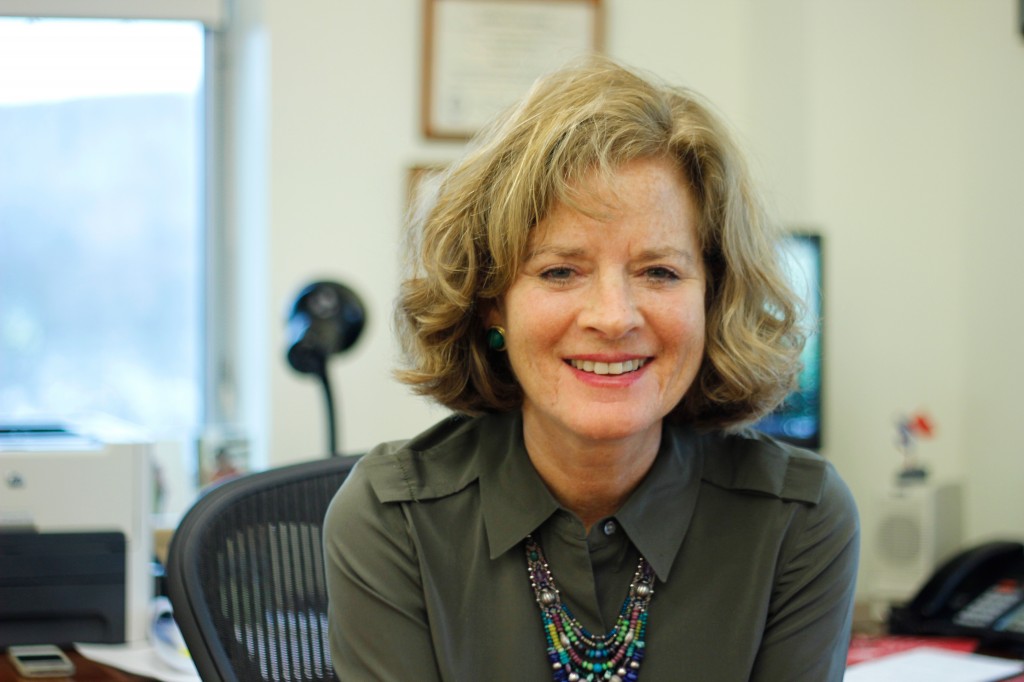
Following a four-month search, interim dean Laura Bronstein was selected out of 80 candidates to lead the College of Community and Public Affairs (CCPA).
Bronstein, who has worked at Binghamton University since 1999, has seen the development of several phases of social work programs on campus.
She said interdisciplinary collaboration, an area President Harvey Stenger focused on during his State of the University address, is vital to the success of CCPA.
“I’m a social worker, so I look at issues that impact society, areas that we’re not doing as much we could do to help people, especially people that are more vulnerable or disenfranchised,” Bronstein said. “I don’t think it’s just one discipline has the answer to that, I think we have to work across sectors.”
Part of Stenger’s Road Map to Success includes hiring faculty members within transdisciplinary areas of excellence, or TAEs. Bronstein said most CCPA faculty align with two or three of the TAEs.
“I think this is an area where CCPA can really be a leader, because our faculty all work across disciplinary lines,” Bronstein said.
CCPA’s recently created interdisciplinary doctoral program is one example of this, according to Bronstein, who said it crosses all four areas of study within CCPA: human development, social work, public administration and student affairs administration.
Bronstein said CCPA is in a planning phase, as she looks to fortify existing programs and seek new developments. Enrollment in CCPA will increase as part of Stenger’s plan to grow total University enrollment to 20,000 students by 2020.
“We’re … having a lot of conversations about ways to grow, and we want to grow strategically and thoughtfully,” Bronstein said. “We’ve started as a new college and developed a lot of great things and it’s a lot of thinking through, ‘Where to we want to go?’”
Provost Donald Nieman said Bronstein’s past work across disciplines is one of the reasons she was selected for the position.
“She just really rose to the top in just about every category that we were interested in, and one of the areas we were interested in was her ability to promote collaboration,” Nieman said.
Chosen from a pool of about 80 applicants from across the United States, Bronstein’s administrative experience and record of scholarship set her apart from the other candidates, according to Nieman.
“When you’re a dean, you have to lead your faculty, and it’s hard to lead your faculty when they don’t respect you as an intellectual and a scholar,” Nieman said.
Additionally, Nieman said Bronstein has a strong record of recruiting faculty and students from underrepresented populations, advancing diversity within CCPA.
“Sometimes you don’t know just how good your colleagues are, but when you put them up against a very competitive field of candidates from across the United States and they … rise to the top, then you just kind of sit back and say, ‘Wow, this person’s extraordinary,’” Nieman said.
Jamie Loren, a senior majoring in human development, said that while she hasn’t yet met with Bronstein, her plans for the school seem promising.
“I am excited,” Loren said. “I hope she improves the school to its full potential because CCPA could be really promising.”
Bronstein said she hopes to see students as excited about their work as she is about her own.
“I love coming to work every day, and I really feel blessed by that,” Bronstein said.
“We want to create an environment where people are learning and really feel enriched and enlivened by what they’re learning. And I think we’re on the road to that, so that’s exciting.”


